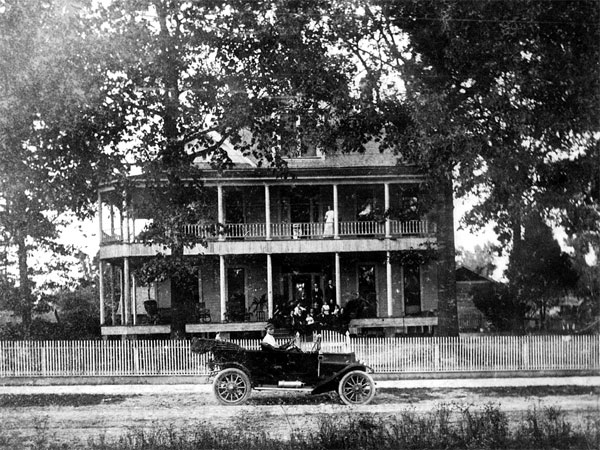"He was hailed as a champion of the poor and reviled as a dictator. Louisiana's Huey Long rose to Governor and U.S. Senator on a platform of social reform and justice, all the while employing graft and corruption to get what he wanted." (Ken Burns)

Huey Long's childhood home in Louisiana courtesy
Huey Long, one of nine children, grew up on a farm in North Louisiana. While most children wanted to go fishing or hunting, Long loved to read, but books were scarce in his community. He had an insatiable curiosity which he indulged early when he learned how to walk at eight months old. As a young boy, he could be found in the nearby town underneath a train to see how it worked. As a teenager, he eschewed farm work for delivering baked goods, setting newspaper type and sales jobs.
His hometown, Winnfield, was a stronghold of populism. Long learned from an early age to look out for the needs of the less fortunate. His mother, a Christian woman who read from the Bible daily and attended evangelical revivals, was always helping the poor. She would often send Long or one of his siblings to a neighbour's home with gifts of food or clothing.
Long was a champion of the "small man" which would become evident when he embarked on a political career. As Governor of Louisiana from 1928 to 1932, he supported many reforms which endeared him to the poor. Long was so determined to become the next President of the United States, that he wrote a book My First Days in the White House. Just as Franklin D. Roosevelt had his New Deal, Huey Long had his Share Our Wealth program which included some radical ideas for the pre-welfare 1930's.
He suggested that every household have a minimum income of $5000 per year so that they could enjoy life's necessities: a radio, a car and a home. Everyone over age 60 should receive an old-age pension. An opponent of banks and big business, Long proposed limiting private fortunes to $50 million, legacies to $5 million and annual incomes to $1 million (https://www.ssa.gov/history/hlong1.html).
In 1929, Long tried to increase taxes on the production of oil but faced strong opposition from the Congress. Long was determined to get what he wanted. As a result, charges of "corruption, bribery and gross misconduct" were brought against Long in an attempt to impeach him. However, he sought the signatures of one third of the Senators to prevent a two thirds majority impeachment. Those senators who signed the document were later rewarded by Long with state jobs, cash or other rewards. Huey Long, who had made many enemies in his career, was assassinated in the State Capitol in 1935, pre-empting his run for president.

Huey Long listed as one of the "Ten Most Corrupt Politicians" courtesy http://www.realclearpolitics.com/lists/most_corrupt_politicians/huey-long.html.
Note: Ken Burns documentary, Huey Long, premiered in 1986 http://www.pbs.org/kenburns/hueylong/film/.
No comments:
Post a Comment